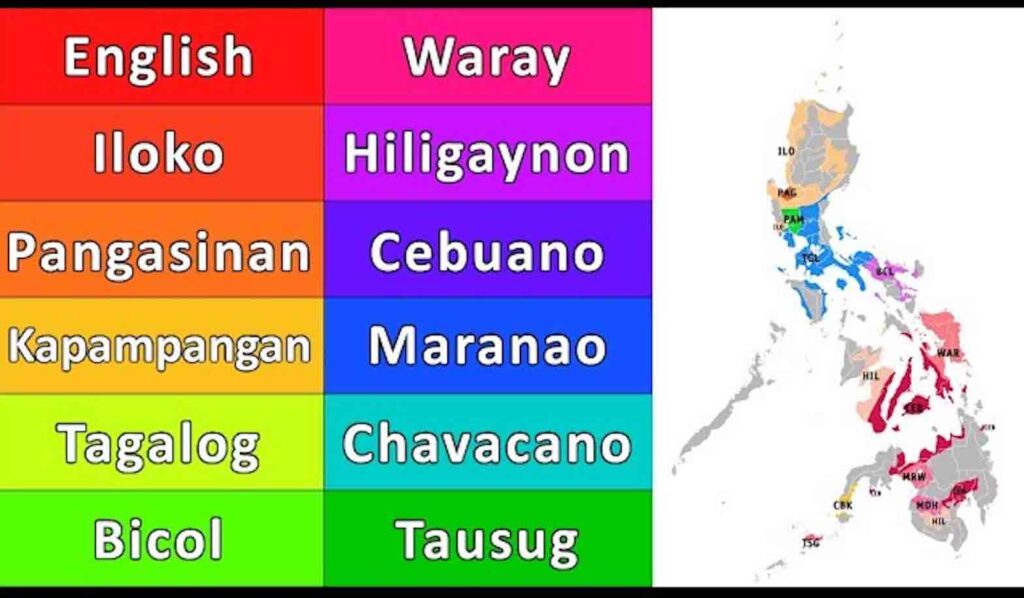
Major Languages of the Philippines: “The multitude of languages indigenous to the island nation were referred to as ‘dialects.’” YOUTUBE GRAPHIC
NEW YORK— He was an upper echelon executive in the communications firm where I was a management trainee, my first job right after graduating from university. He had gotten his graduate degree in business, from Harvard. When speaking to his fellow executives or to us lowly employees, he would affect a kind of accent that toggled between Boston’s preppy English and Brit diction, to impress upon us that not only had he studied in the good old US of A, he had gone to the Mecca of higher education, Hahvahd (as he pronounced it). Acceptance into its hallowed halls was not just prelude to but an almost iron-clad guarantee of a glorious career. We trainees were suitably impressed. Of course, looking back it was pure unmitigated colonial mimicry, continuing the dubious tradition of the brown little brother aspiring to fill the shoes of his bigger, older, presumably more civilized white brother.
I bring this up as this past spring, I learned that Harvard had hired an instructor to teach Tagalog, the first time in its nearly 400 years of existence that it was offering such a course. I was delighted. It was about time the hoary institution, founded in 1636, acknowledged that Tagalog (the basis of the Philippine national language, Filipino) is the fourth most common tongue spoken in the States. At New York University it has been offered for more than two decades, and I am one of two instructors that teach it, with Barnard and Columbia students allowed to cross register and trek downtown for the classes.
It turns out that the funds being made available to Harvard are said to be from Philippine Congressman Martin Romualdez, Speaker of the House of Representatives, and nephew of Imelda Marcos and first cousin to her son, BongBong Marcos, or BBM, posing as president of the Philippine Republic. Of course this bit of news spread quickly, and protests ensued. (This paper covered the story but shortly after it appeared was unceremoniously taken down. The spouse of the Inquirer’s publisher, it turns out, is the congressman’s brother.)
The whole controversy over the alleged provenance of the funding for the course reminded me of how when my generation and I were in high school, we were forbidden to speak not just Tagalog but any of the multitude of languages indigenous to the island nation, though none of these were considered languages. Instead, they were referred to as “dialects,” an inaccurate and misleading label, as according to linguists the formal distinction between “language” and “dialect” is blurry. The intent in this case, however, was crystal clear: in the colonial mindset Tagalog was viewed as a lesser tongue, conforming to the racial hierarchy of white at the top and brown below.
My school was in the metropolitan Manila district, the nation’s capital, where Tagalog was and is the lingua franca for the mostly working-class majority of its residents. But not on campus. Strictly verboten, as English was the official tongue. If you were caught speaking Tagalog, the school rulebook mandated punishment. One such punishment was Post: you were posted facing a wall, rather like a sentry, shouldering a wooden rifle, and you had to be absolutely still and quiet— just like a post. Whoever stood post had to bear the jokes and gibes fellow students would make as they walked by.
The language of our ancestors, that had roots in the soil, in the air, in the very land- and seascapes that nurtured us, was cast as a wallflower while the center of the dance was the arriviste, the newcomer, the masculine English of the Yankee displacing the former arriviste, Castilian Spanish, that had been around since the 16th century. Out with the old, in with the new!
Where the pioneering American teachers—known as the Thomasites, after the ship SS Thomas that transported them to the archipelago—and their brown-skinned successors enforced an English-only educational system, the Spanish had quite the opposite take. For the most part, native Filipinos, referred to disparagingly as “indios,” were discouraged from speaking Spanish. (The native elite however were exempt.) The notion was that lesser mortals should not attempt to speak the language of Cervantes. The Spanish friars themselves spoke Tagalog and several other indigenous languages, thus arrogating to themselves the powerful role of mediator/translator for their indio parishioners many of whom spoke very little Spanish and who needed to deal with the colonial government. This prejudice against the islanders learning Spanish is why in this former Spanish possession, unlike in Latin America, Spanish remains a language spoken only by a minority.
Culturally, we are Southeast Asia’s Latinos, with our fiestas, siestas, and iglesias. Add a heavy dose of American mores and tastes, and a deep-seated connection with our Indo-Malay heritage and voila! You have the modern, hybrid, ever-adaptable Filipino, a hardy survivor of the colonial virus, proving Nietzsche’s dictum, that whatever doesn’t kill you will make you stronger.
Copyright L.H. Francia 2023

